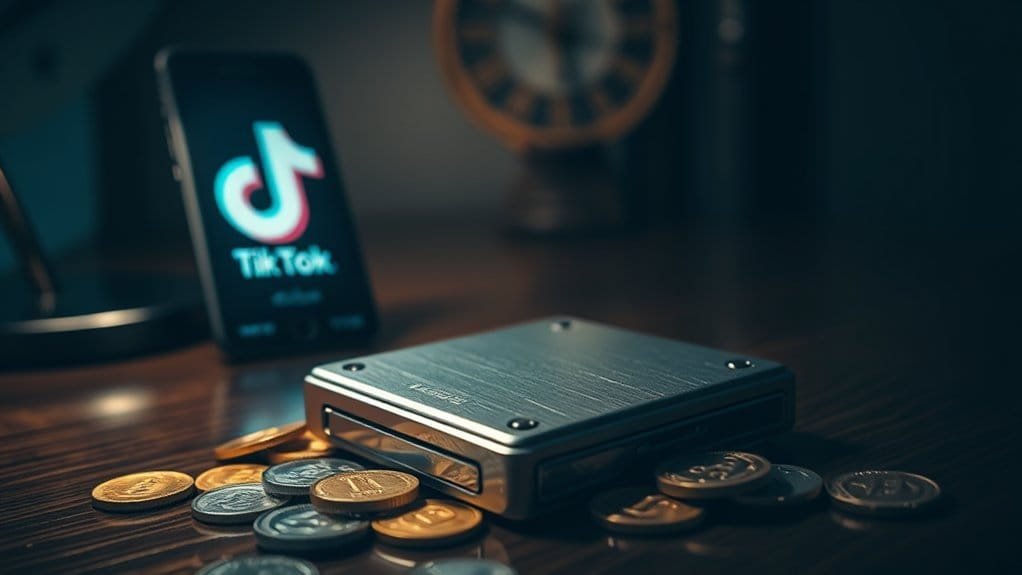TikTok: dance videos and, uh, a TikTok crypto scam. Surprise! One user got fleeced for $6.9 million in a cold wallet scam. Seriously? TikTok’s massive audience, especially those young’uns, makes it a scammer’s paradise. Social media? Over 30% of potential scams originate there. NASAA warns about these scams, but some folks just don’t listen. AI makes these scams sophisticated. FOMO is a powerful drug. More to uncover. Gold Price Prediction: Bank of America Forecasts $4,000?

TikTok, that endless scroll of teenage dances and questionable life hacks, has a dark side. What’s that? You thought it was all harmless fun? Think again. It’s also a festering pool for crypto scams, and it’s costing people real money. Like, a lot of money. Someone actually lost $6.9 million to a cold wallet scam, and it all started on TikTok. Seriously?
The allure is clear: TikTok’s massive reach, especially with younger audiences, makes it a prime hunting ground for scammers. It’s like shooting fish in a barrel. Social media accounts for over 30% of potential scams. Because most online wallets can be counterfeit, it’s important not to purchase discounted wallets from unverified vendors. Considering that many listed wallets are offered below asset value, this should raise a red flag for prospective buyers. Enhanced security measures are crucial to protect against such scams.
Then, enter the deepfake dangers. Scammers use AI to create these super-convincing videos of celebrities endorsing some random crypto exchange. It’s all so convincing, it’s scary. They promise big Bitcoin rewards to lure you in, just needing a small crypto transfer to verify your account. Surprise, surprise: It’s a trap. You send them crypto, and bam! It’s gone. Vanished.
And people fall for this? Apparently. Victims get hooked by the promise of easy money. These scammers pull out all the stops, even providing promo codes for fake exchanges that magically credit your account with Bitcoin.
The catch? To withdraw, you gotta send them your own crypto, supposedly for “verification.” It’s the same old trick, but people still fall for it. Over and over. FOMO is a hell of a drug, obviously.
So, what’s being done? The regulatory challenges are real. NASAA has issued warnings about these scams, basically telling people to not be idiots, but, hey. Many investors just don’t listen.
Regulatory bodies are trying to educate the public, but can you really fix stupid? These scams are just getting more sophisticated, thanks to AI. Deepfakes are insanely convincing. The scams can spread faster, target more people, and evade detection better.
TikTok offers the perfect environment; global reach, short videos. It’s a scammer’s paradise.
Frequently Asked Questions
Are There Resources for TikTok Crypto Scam Victims?
Are there resources? Absolutely.
Crypto scam victims aren’t totally screwed; that’s a relief, right? Support networks exist.
FINRA, for instance, works with the Cybercrime Support Network, offering counselor-led groups.
Emotional pathways? Sure, why not? Legal assistance options might be available.
Filing a police report is essential. The FBI wants those reports. Acting fast can make a difference.
Don’t just sit there.
How Can I Identify Crypto Scams on Tiktok?
Spotting crypto scams on TikTok? Easy…said no one ever.
Obvious scam indicators include guaranteed returns and “urgent” demands. Right, because who *doesn’t* have crypto to give away?
Deepfake celeb endorsements should raise eyebrows; they couldn’t get the real person?
Check for TikTok safety resources. Still, some scams are smooth.
Verify information independently; don’t trust randos. If it’s too good to be true? It is!
Is Tiktok Responsible for User Losses?
Is TikTok responsible? Tricky.
Platform accountability is debated. TikTok provides the interface, but is it a babysitter? They profit, sure. User responsibility matters; don’t be gullible.
Regulators push for better oversight. Due diligence is key. Losing millions? Ouch. Acting fast? Red flag!
TikTok can do more. Ultimately, users need to wake up. Consider it a very expensive lesson.
What Regulations Exist for Crypto Promotions?
So, about those crypto regulations.
Promotion guidelines are popping up all over. Governments are getting involved. Financial bodies, too. Expect AML/KYC rules.
Gotta watch out for the SEC and CFTC; they are not messing around. States? Legislation everywhere.
Marketing needs clear risk disclosure, team info. You know, the basics.
Compliance? It builds trust. Non-compliance? Can halt operations, damage reputations.
It is a mess, but that’s crypto.
How Are Cold Wallets Compromised Remotely?
Remote hacking techniques don’t directly target cold wallets. Why? They are offline.
Cold wallet vulnerabilities, however, get exploited through indirect means. Think social engineering. Tricking users.
Firmware hacks? A possibility, if someone gets physical access.
Supply chain attacks are sneaky.
Still, cold wallets are generally safer if users don’t do dumb stuff online. No guarantees, though, right?
